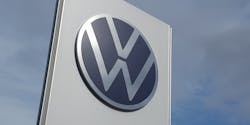VW Expects 'Significant' Revenue Increase in 2021
German auto giant Volkswagen on Friday said it expected to see a significant sales increase this year as the industry bounces back from the coronavirus shock.
The group, which also includes the Porsche, Audi and Skoda brands, booked a net profit of 8.8 billion euros ($10.6 billion) for 2020, a 37-percent plunge on the year before.
VW said it had been badly hit by global lockdowns in the early days of the pandemic, but the damage was mitigated thanks to a swift rebound in the key Chinese market and robust demand in the luxury segment.
"The Volkswagen group closed fiscal year 2020 stronger than expected despite the Covid-19 pandemic," it said in a statement.
Sales revenue for 2020 amounted to 222.9 billion euros, or $272.2 billion U.S. dollars, down almost 12 percent on 2019.
Like other carmakers, VW suffered from production disruptions and dealership closures last year as countries imposed shutdowns to slow the initial spread of Covid-19.
Virus curbs eased in the second half of the year, allowing customers to return to showrooms and factory lines to keep rolling.
Overall, the VW group sold more than 9.2 million vehicles in 2020, falling below the sought-after 10 million threshold for the first time in recent years.
Japanese rival Toyota announced last month that it had sold 9.5 million vehicles last year, taking VW's crown as the world's top-selling carmaker for the first time since 2015.
But VW looked on the bright side, noting that it had delivered 422,000 electric vehicles over the period, "three times as many" as in 2019.
The electric boost comes against a background of tough new pollution regulation in the European Union, spurred in part by Volkswagen's 2015 "dieselgate" emissions cheating scandal which accelerated a shift towards greener vehicles.
NordLB bank analyst Frank Schwope said VW was on track to deliver between 500,000 to 700,000 battery-powered vehicles in 2021.
He predicted that by 2022 the German giant "could be on par with Tesla", the pioneer electric carmaker headed by billionaire entrepreneur Elon Musk.
Chip crunch
Looking ahead, VW's chief financial officer Frank Witter said the group was "optimistic" about hitting the higher end of its targets for 2021.
"We intend to carry over the strong momentum from the significantly better second half into the current year, and the programs for reducing our fixed costs and in procurement will make us more robust in the long term," he said.
VW expects sales revenues to be "significantly higher" than last year, while car deliveries would also be "significantly up" on 2020.
VW cautioned however that the forecasts are based on the "successful containment" of the pandemic.
It said much would also depend on the global economic outlook, which is rife with uncertainty as countries in different stages of fighting the virus face an uneven recovery.
VW also highlighted supply chain upsets as a key challenge to watch, in a nod to the industry's current semiconductor shortage as the pandemic boosts demand for crucial microchips also needed for consumer electronics.
The chip crunch has forced VW and a slew of other carmakers including General Motors and Ford to trim auto production at some plants, delaying car deliveries.
Copyright Agence France-Presse, 2021
About the Author
Agence France-Presse
Copyright Agence France-Presse, 2002-2025. AFP text, photos, graphics and logos shall not be reproduced, published, broadcast, rewritten for broadcast or publication or redistributed directly or indirectly in any medium. AFP shall not be held liable for any delays, inaccuracies, errors or omissions in any AFP content, or for any actions taken in consequence.
